
Looking for the best things to do in Rome in 2 days? You’ve come to the right place. I grew up in the Eternal City and have lived there for 12 years, so have come to know it like the back of my hand.
While two days are not quite enough to discover everything the city has to offer, this unique 2 days in Rome itinerary will guide you through the essential must-see attractions and a few hidden gems, so that you can experience the city’s top highlights.
You’ll also find insider tips on how to budget and skip the lines, find the best sunset spots, enjoy locally-approved eateries, and essential tips for spending a weekend in Rome.
So without further ado, I hope you enjoy this unique local’s guide to Rome in two days.
You might also be interested in:
🏡 Where to Stay in Rome: Best Areas + Hotels
🏠 12 Best Rome Hotels with Colosseum Views
🛵 3 Days in Rome: The Ultimate Itinerary
Disclosure: This article contains affiliate links. If you make a purchase after clicking one of these links, I earn a small commission at no extra cost to you. You can learn more about this in my disclosure policy.
🌟 2 Day Rome Itinerary: Top Tips
🏡 WHERE TO STAY
Most scenic: Otivm Hotel (⭐ 9.0)
Most romantic: Singer Palace (⭐ 9.5)
Luxury pick: Martis Palace (⭐ 9.4)
Budget pick: Hotel Amalfi (⭐ 8.6)
👩🏻 BEST GUIDED TOURS
The Best Colosseum Tour (⭐️ 4.7/5)
The Best Vatican Tour (⭐️ 4.6/5)
The Best VIP Vatican Tour (⭐️ 4.8/5)
The Best Pantheon Tour (⭐️ 4.9/5)
- 🎟️ Skip the long lines at the Vatican with the Vatican Fast-Entry Ticket
- 🎟️ Skip the long lines at the Colosseum with the Colosseum Fast-Entry Ticket
- ✈️ Book a cheap Shuttle Bus Transfer to get between the airport and the city
- 🍝 Learn top secrets at a fun pasta-making class with a local chef!


🇮🇹 2 Days in Rome Itinerary Overview
Here’s an overview of what to see in Rome for 2 days, with all the attractions covered in this itinerary. This is also the ideal trip plan for Rome for a weekend.
Day 1 — Vatican Museums, St. Peter’s Basilica & Dome, Castel Sant’Angelo, Lungotevere & Ponte Umberto I, Piazza Navona, Pantheon, Campo de’ Fiori + Food Tour, Isola Tiberina
Day 2 — Colosseum, Roman Forum & Palatine Hill, Piazza del Campidoglio, Vittoriano, Trevi Fountain, Spanish Steps, Terrazza del Pincio, Villa Borghese + Galleria Borghese
🌟 Top Tip: If you’re planning to see Rome in a weekend, remember that the Vatican Museums & Sistine Chapel are closed on Sundays. (Except for the last Sunday of every month, when it’s open and also free. More on that in the Vatican section below.)

Related: Where to Stay in Rome: The Best Areas + Hotels
🗓 Day 1 in Rome: Vatican City + Food Tour
1. Vatican Museums & Sistine Chapel
Suggested visit time: 8:30 am / Visit duration: 2.5-3 hours
Start your 2-day Rome itinerary by exploring Vatican City, a tiny country inside the center of Rome. The Vatican is the heart of the Roman Catholic Church and the world-famous residence of the Pope.
There are two main sites to see in the Vatican: the Vatican Museums and the St. Peter’s Basilica. If you’re in Rome during Christmas or Easter, you’ll be able to catch the Pope speaking from St. Peter’s Square, which surrounds the St. Peter’s Basilica.

Start your visit to Vatican City with the Vatican Museums. There are many remarkable rooms and hidden gems inside the Vatican Museums. Among the best ones are the Gallery of Maps, the Raphael Rooms, and the Gallery of the Chandeliers.
The key attraction inside the Vatican Museums is the famous Sistine Chapel, which Michelangelo spent four years painting. The frescoes that cover the walls and ceiling there are simply jaw-dropping. Note that it’s sadly not allowed to take photos inside.


🧔🏻 Why You Should Visit the Vatican on a Guided Tour
- You’ll get skip-the-line entrance, which will save you hours of waiting in line — quite essential if you only have two days or a weekend break in Rome.
- Enter the St. Peter’s Basilica through a guided-tours-only passageway that’ll save you 20 minutes of walking there + hours of lining up.
- Some tours give you exclusive access to the museums before opening hours so that you can beat the crowds and enjoy the attractions in peace and quiet.
🌟 My Recommendations: The Best Guided Tours of the Vatican
- Vatican Museum, Sistine Chapel & St. Peter’s Basilica Tour (⭐️ 4.6/5) — An expert guide will take you to the most interesting parts of the Vatican Museums and the magnificent St. Peter’s Basilica.
- Early Entry to Museums & Sistine Chapel – Small Group Tour (⭐️ 4.8/5) — Get early entrance before the crowds and enjoy the Vatican with an expert guide.

🌟 Top Tips for Visiting the Vatican Without a Guided Tour
- Book a skip-the-line entry ticket to enter the museums through a separate reserved entrance (the fastest one available). It only costs €5 more than the regular ticket but will save you literally hours of waiting in line.
- Get free entry and skip the lines with the OMNIA Rome Card or the Best of Rome Pass.
- During the peak season of May to mid-September, arrive at least 15-30 mins before the opening time to avoid the long lines (unless you have a skip-the-line ticket).
- Avoid visiting on Mondays or over the weekend as that’s when the museums are the most crowded. (All the other museums in Rome are closed on Mondays, making the Vatican especially popular on that day.)
- The museum is free every last Sunday of each month, but be sure to arrive early in the morning if you don’t want to stand in line for hours. (Check official real-time updates as this offering is sometimes suspended.)
- Be sure to dress appropriately — both men and women are required to have their shoulders, thighs, and necklines covered.

⏰ Opening hours: See here for live info 🎫 Entrance fees: Adults - €25 | Youth & students under 18 - €8 🧔🏻 Recommended guided tour: Vatican Early Entrance Small Group Tour (⭐️ 4.8/5)
2. St. Peter’s Basilica & Dome
2 min walk from Sistine Chapel through a passageway reserved for guided tours
Or 20 min walk from the Vatican Museums + wait in a long line (without a guided tour)
Suggested visit time: 11:30 am / Visit duration: 1.5-2 hours
After exploring the Vatican Museums, it’s time to visit the majestic St. Peter’s Basilica. This basilica took 120 years to build and is the largest church on earth. It also has the world’s tallest dome, which you can climb up to for a spectacular view of Rome.
St. Peter’s Basilica is the holiest and most important pilgrimage site of the Catholic Church. Inside, you can see incredible pieces of art, such as Michelangelo’s famous Pietà sculpture. Everything from the ceiling to the pillars of this church is jaw-droppingly impressive.
You can even attend Holy Mass inside St. Peter’s Basilica. On weekdays, it’s held at 8:30 am, 9 am, 10 am, 11 am, 12 pm, and 5 pm. On weekends and public holidays, it takes place at 9 am, 10:30 am, 11:15 am, 12:15 pm, 1 pm, 4 pm, 4:45 pm, and 5:30 pm.

🔥 Top Tip: If you visit the Vatican with a guided tour, you can get from the Sistine Chapel to St. Peter’s Basilica in just 2 minutes using a passageway reserved for group tours. If you visit on your own, you’ll have to exit the Vatican Museums, walk for 20 mins to St. Peter’s Basilica, and then stand in a long line (that can take hours) to enter.
Don’t leave St. Peter’s Basilica without climbing to the top of its dome (cupola). Do this climb before you explore the basilica (and as early as you can) to avoid the mid-day heat and the long lines that will form later in the day.
To get to the top of the dome, you can either climb all 551 steps by foot or take a lift to the terrace and climb the remaining 320 steps by foot. From the dome, you’ll get a breathtaking view of St. Peter’s Square and the whole city of Rome — it’s a sight you won’t want to miss.

⏰ Basilica & Dome opening hours: See here for live info 🎫 Basilica entrance fees: Free 🎫 Dome entrance fees: Elevator + 320 steps: €10 | Walk all 551 steps: €8 🧔🏻 Recommended guided tour: Vatican Early Entrance Small Group Tour (⭐️ 4.8/5)
Read more: 12 Stunning Rome Hotels with Colosseum Views
3. Lunch Near Vatican City
Recommended duration: 1:30 pm – 2:30 pm
Most of the cafés and restaurants immediately surrounding Vatican City are overpriced tourist traps. But, a 10-15 min walk will get you to some really authentic eateries. Head to Osteria dell’Angelo if you’d like to sit down for some exquisite carbonara.
If you’re tight on time or budget, there are some great options too. Head over to 200 Gradi for some yummy panini, or to Pizzarium Bonci for some authentic pizza al taglio (pizza “by the slice”). This is a traditional Roman pizza that’s cut in rectangular slices.
You can find a variety of delicious pizza al taglio toppings, such as artichokes, potatoes, shrimps, prosciutto, sun-dried tomatoes, black olives, and zucchini. I highly recommend trying this pizza at least once!

4. Castel Sant’Angelo
10 min walk from St. Peter’s Basilica
Suggested visit time: 2:45 pm / Visit duration: 10-15 mins
After filling up your belly, it’s time to see a breathtaking fortress. Castel Sant’Angelo is an easy stroll from St. Peter’s Basilica. This fortress was built by Emperor Hadrian in AD 139 and was intended to be used as a tomb for the emperor himself.
In the course of its history, Castel Sant’Angelo has protected the Pope during various sieges. Today, you can go inside this fortress to see the rooms where the Pope used to reside and to get some magnificent views of Ancient Rome from the terrace.

To be honest, since your morning at the Vatican will be pretty packed, I recommend simply admiring this fortress from the Ponte Sant’Angelo — the big bridge in front of it. You’ll find some pretty statues and plenty of cool angles for photos.
However, if you haven’t yet had enough of panoramic views of Rome and would like to go inside this fortress, I highly recommend booking a skip-the-line ticket.
🎆 Insider Tip: Every year on June 29th, there are stunning fireworks at Castel Sant’Angelo to celebrate the Festa di San Pietro e Paolo, a public holiday in Rome. The atmosphere at the fortress is simply incredible then, so be sure to drop by at night to witness this magic!

⏰ Opening hours: 9 am – 7:30 pm daily (last entry at 6:30 pm) 🎫 Entrance fees: Adults - €20.50 | EU citizens aged 18 – 25 - €3 (These fees are for going inside the fortress. Taking photos on the bridge is obviously free 🙂)
5. Lungotevere & Ponte Umberto I
Start right under the Castel Sant’Angelo bridge
Suggested visit time: 3 pm / Visit duration: 30 mins
Castel Sant’Angelo is right next to the River Tiber, and all along this river is the Lungotevere — a pedestrian riverbank that offers spectacular views. It’s the perfect place to go for a stroll.
From the Castel Sant’Angelo bridge, simply take the steps down to the riverbank. Go for a walk along it, and bring a bottle of wine and snacks if you enjoy picnicking by the water.
🌿 Insider Tip: For the best views, walk alongside the riverbank from the Castel Sant’Angelo bridge towards Ponte Vittorio Emanuele II. Then, step onto that bridge to see the stunning Castel Sant’Angelo reflecting in the water!


As you can imagine, there are tons of scenic bridges arching over River Tiber. One of the most photogenic ones is Ponte Umberto I, the one bridge you shouldn’t miss on your Rome in 2 days itinerary. From there, you can see the majestic St. Peter’s Basilica reflecting in the water.
If you can visit Ponte Umberto I during sunset, that’d be even better. You get to see the sky turning pink and orange above the ancient monuments of Rome — an incredibly peaceful sight as the whole city dims.
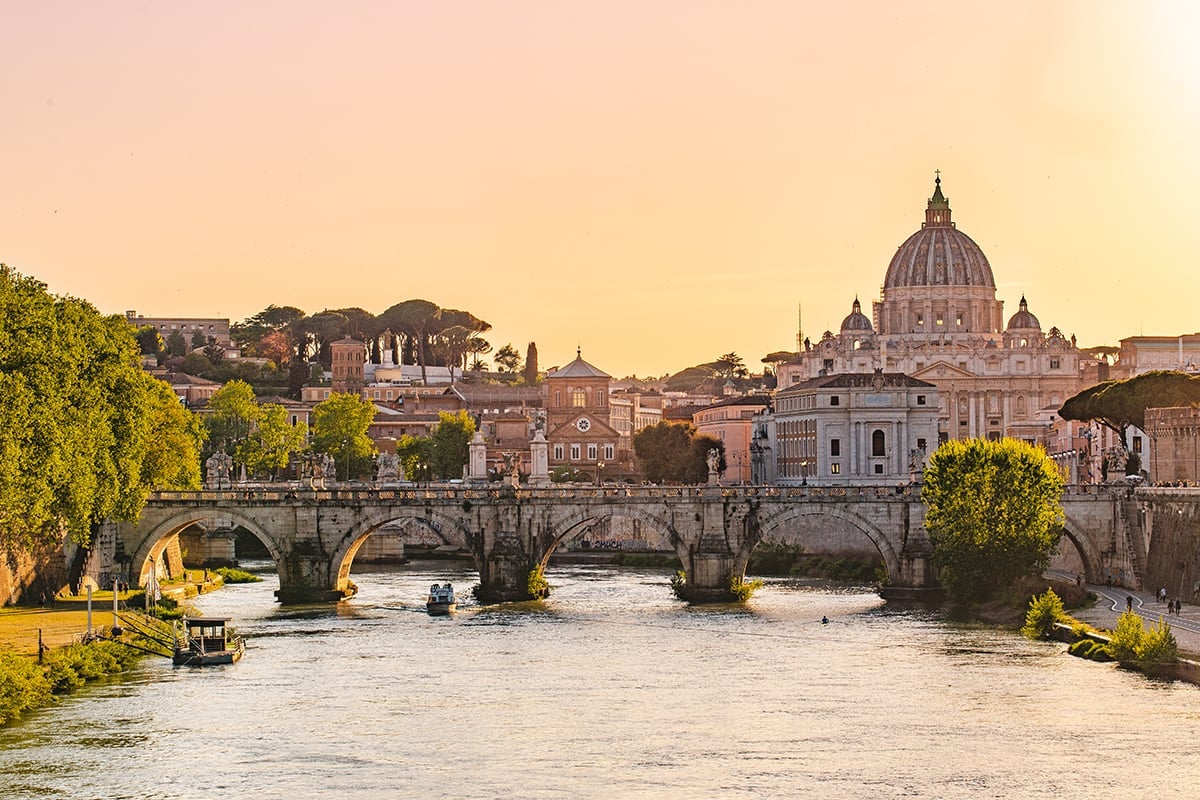
6. Piazza Navona
5 min walk from Ponte Umberto I
Suggested visit time: 3:30 pm / Visit duration: 20-30 mins
Are you ready to walk into a painting? That’s what stepping into Piazza Navona feels like. This square is one of the most artsy places in Rome, and it’s just a few minutes by foot from Ponte Umberto I.
In the past, Piazza Navona hosted many festivals and sporting events. Today, it’s a hub for street entertainers, artists, and musicians — all of whom make the atmosphere inside this square incredibly vibrant, cheerful, and laid-back.


Piazza Navona is home to three magical fountains. The most impressive one is Fontana dei Quattro Fiumi, which stands at the center of the square. This fountain was designed by Bernini in 1651 and showcases some amazing sculptural art.
Take a stroll and watch artists paint their own renditions of Rome. If you enjoy caricatures, you can even have your own drawn for you in this square.
Lastly, don’t forget to get an exquisite gelato from GROM, located right by the northern entrance of the square.
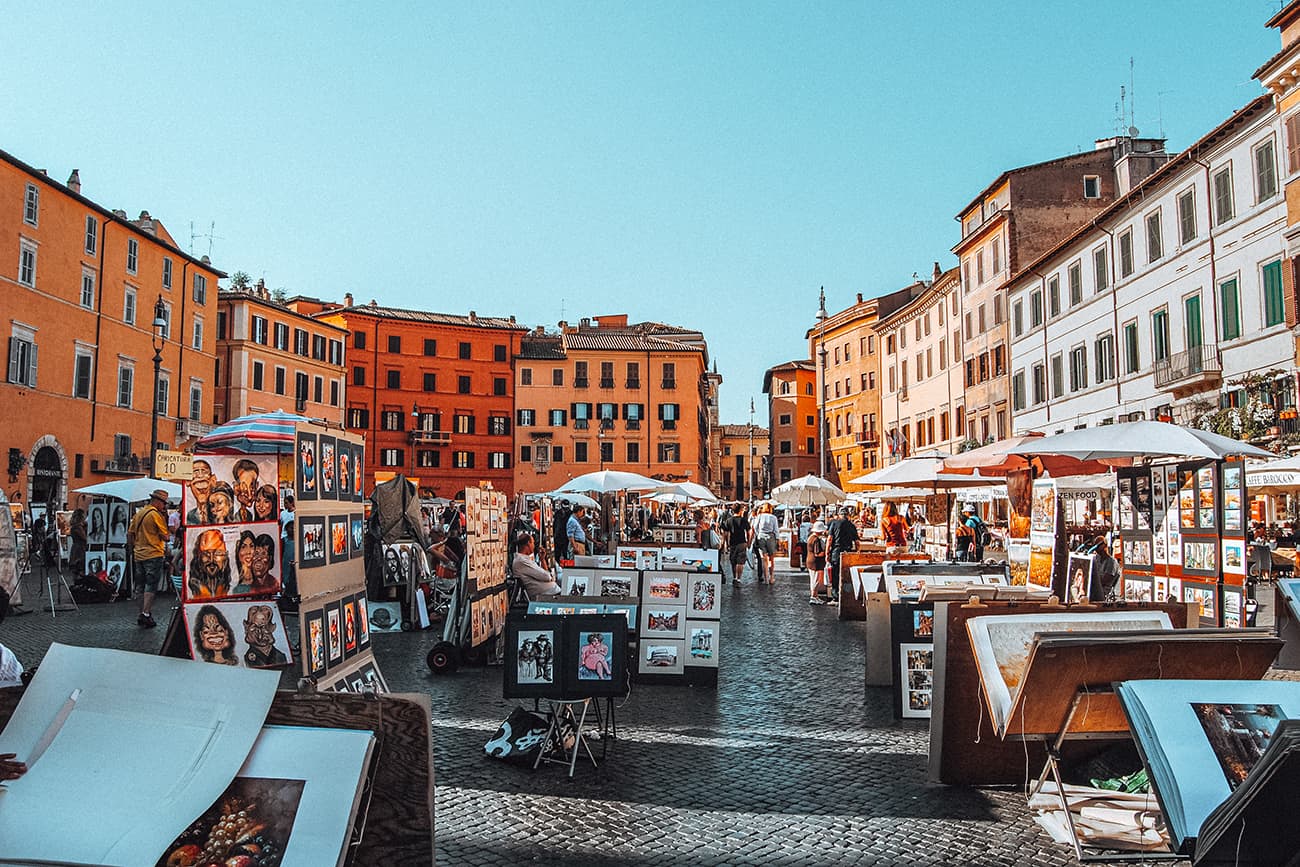
🍕 Insider Tip: There are many restaurants inside Piazza Navona, but the majority of them are excessively pricey tourist traps. Instead, just a few steps outside this square, you’ll find the much more authentic Mimì e Cocò or Cantina e Cucina.
7. Pantheon
5 min walk from Piazza Navona
Suggested visit time: 4 pm / Visit duration: 45 mins – 1 hour
The next stop on this 2-day / weekend in Rome itinerary is the historic Pantheon, one of the most well-preserved and ancient structures in the Eternal City.
Completed between 126 – 128 AD, the Pantheon is a Roman temple dedicated to the gods of pagan Rome. Later on, it was converted to a Christian church.
Today, the Pantheon continues to function as a church, and Catholic Mass is regularly held there. It is also the burial place of important Italian figures like Renaissance artist Raphael and Vittorio Emanuele II, the first king of Italy.

The architecture inside the Pantheon is simply marvelous. As famous painter Michelangelo once put it, “it was the design of angels, not of man”.
To understand what he meant, simply take a walk inside this monument. You’ll see that the building’s dome has a distinctive central hole — “the oculus” — which opens up to the sky.
🔥 Insider Tip: As of July 2023, entrance is no longer free and costs €5. While you can pay directly at the entrance, I highly recommend booking a skip-the-line entry ticket as this is one of the most popular and crowded places in Rome.
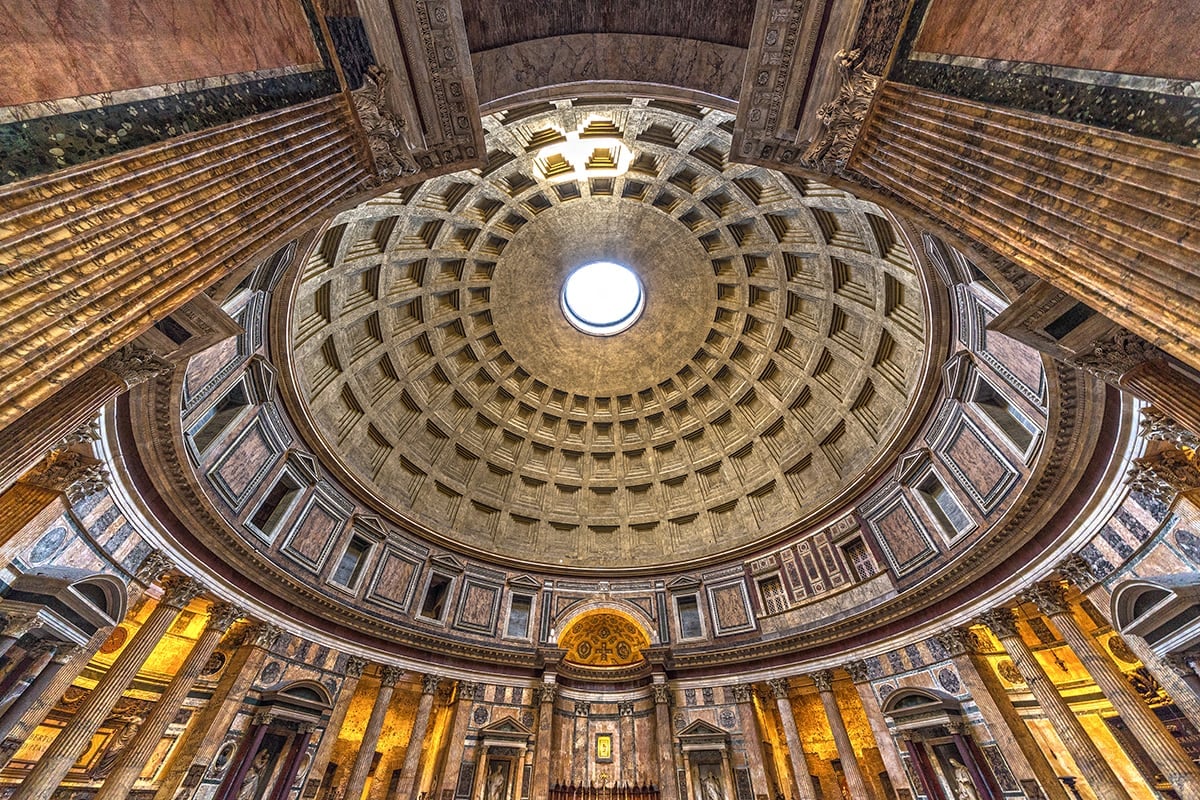
⏰ Opening hours: 9 am - 7 pm daily (last entry at 6:30 pm)
🎫 Entrance fees: €5 for a skip-the-line entry ticket
🧔🏻 Recommended guided tour: Pantheon Guided Tour (⭐️ 4.9/5)
Related: 22 Most Beautiful Places to Visit in Italy
8. Campo de’ Fiori + Evening Food Tour
10 min walk from Pantheon
Suggested visit time: 5 pm / Visit duration: 3-4 hours
End your first day of this two days in Rome itinerary with an exquisite food tour. First, make your way to Campo de’ Fiori, a vibrant square that hosts farmers’ markets during the day but turns into the hub of Rome’s nightlife by evening.
Sit down at one of the many outdoor bars in Campo de’ Fiori and savor an aperitivo, an Italian pre-meal drink meant to stimulate your appetite. Then, choose one of the several guided food tours that begin at around 6 pm either inside or near Campo de’ Fiori.
I do recommend coming back to this square after dinner if you want to check out Rome’s nightlife.

🍕 Why You Should Join a Guided Food Tour in Rome
Joining a guided food tour will allow you to truly immerse yourself in the local culture and taste some unique specialties you’d have a hard time finding on your own.
A typical food tour will take you to the top food establishments in town — eateries that have been in business for centuries and that are widely adored by locals. You’ll also get to learn some secret Italian food tips from expert chefs.
🌟 My Recommendations: The Top 2 Evening Food Tours of Rome
- Jewish Quarter Street Food Tour (⭐️ 4.8/5) — Taste your way through the iconic Jewish Quarter and get introduced to the best Roman street food.
- Trastevere Food & Wine Tour with 20+ Tastings (⭐️ 4.9/5) — Visit 4 locally loved restaurants to enjoy classic Roman cheese, pasta, pizza, gelato, wine, and more.

9. Isola Tiberina – Summer Evening Drinks
If you’re visiting Rome in the summer, then the pop-up bars at Isola Tiberina (Tiber Island) are a great place to enjoy a refreshing drink or two after your food tour or dinner.
Isola Tiberina is a charming little island in the middle of River Tiber. Though it’s interesting to see during the day as well, it truly comes alive on summer nights.
Exclusively on summer nights, rows of pop-up bars, food stalls, and live music fill the riverbanks of the island. There are also tons of restaurants year-round on the island, as well as an outdoor cinema in the summer.

🗓 Day 2 in Rome: Ancient Rome + Historic Center
1. Colosseum
Suggested visit time: 8:30 am / Visit duration: 1.5 hours
Start the second day of your 2 days itinerary in Rome with the majestic Colosseum. Built between 72 AD and 80 AD, this monument quickly became the greatest amphitheater and the main entertainment hub of the Roman Empire.
With almost 2,000 years of history, the Colosseum provides an insightful glimpse into life during the ancient Roman Empire. This amphitheater could hold more than 50,000 spectators at once and has seen countless gladiator games over the centuries.
Book your skip-the-line Colosseum tour
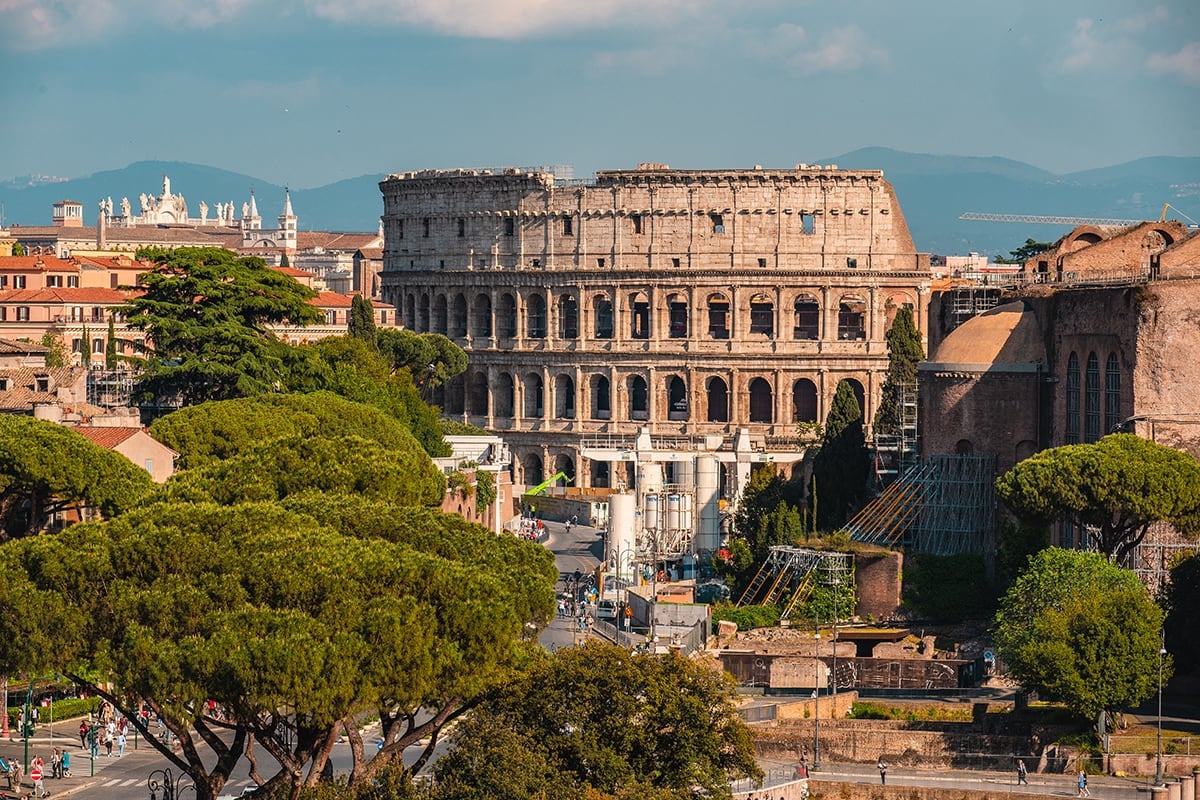
The gladiators not only fought each other, but also exotic animals such as tigers, elephants, bears, and rhinos. It is estimated that more than 500,000 gladiators and 1 million wild animals have lost their lives during the 500+ years the games took place.
Since the 6th century, the Colosseum suffered damages from earthquakes, lootings, and WWII bombings. That’s why only part of it is still standing today. Thanks to its extensive history, it is listed as one of the Seven Wonders of the Modern World and is one of Rome’s most popular tourist attractions.
What does this mean? Unless you plan your visit in advance, you’ll be standing in line for hours. While you can book an entry ticket online, I highly recommend joining a guided tour instead, and I’ll explain why below.

🧔🏻 Why You Should Visit the Colosseum on a Guided Tour
Exploring the Colosseum on a guided tour is the fastest way to get in and the best way to maximize your time. Given the sheer number of tourists visiting the Colosseum, there will always be a long line at the entrance, even if you book your tickets online.
With a guided tour, you can join a very short line and be inside the Colosseum in no time. Your guide will then navigate you to all the key spots inside so you won’t have to spend time finding them. After all, if you can only visit Rome in 2 days, there’s very little time to waste.
Plus, with an expert local guide, you’ll be able to better understand and appreciate the history of the Colosseum. Depending on the tour you book, you can also get exclusive access to restricted areas of the Colosseum, such as the Arena and the Underground.
🌟 My Recommendations: The 2 Best Guided Tours of the Colosseum
- Colosseum, Roman Forum & Palatine Hill Priority Access Tour (⭐️ 4.7/5) — The most classic tour of the Colosseum with priority entry and a guided tour of the Palatine Hill & Roman Forum: the political, social, and religious hub of the Roman Empire.
- Colosseum Underground & Arena + Roman Forum Tour (⭐️ 4.8/5) — This tour takes you to the Colosseum’s arena and underground levels, which are notoriously difficult to access. It also includes a scenic tour of the Roman Forum.


🏟 Top Tips for Visiting the Colosseum Without a Guided Tour
- Buy a skip-the-line entry ticket — it costs an extra €3 but can save you hours of waiting in line, especially in peak and shoulder seasons.
- The best time to visit the Colosseum is at 8:30 am, right when it opens. Reserve your timeslot when you book your ticket (it’s mandatory) and arrive at least 30 mins before opening time to get through the entrance faster.
- You can get free entry to the Colosseum with the Roma Pass. It’s still mandatory to reserve your timeslot online in advance.
- There’s a cap on the number of visitors allowed per day. If tickets on the official website are sold out for the day you want to visit, you can still buy your ticket via Tiqets here.
- You’ll see considerably fewer crowds at the Colosseum from November to March.
- Visiting with kids: Anyone under 18 gets free entry to the Colosseum, but their visit cannot be booked online. If you’re an adult who booked your ticket, your child will receive their free ticket when entering with you.
- If you’re under 18 and visiting without an adult, you can get your free ticket at the ticket office on-site (by standing in line).

⏰ Opening hours: See here for live info
🎫 Entrance fees: (Combined Colosseum + Roman Forum + Palatine Hill ticket) Regular - €18 | EU citizens aged 18-25 - €4
🧔🏻 Recommended guided tour: Colosseum, Roman Forum & Palatine Hill Tour (⭐️ 4.7/5)
2. Roman Forum & Palatine Hill
5 min walk from Colosseum
Suggested visit time: 10 am / Visit duration: 1.5 hours
A ticket to the Colosseum includes same-day entry to its historic next-door neighbors: the Roman Forum and Palatine Hill. The Roman Forum was the center of political, religious, and social life during the Roman Empire.
Walking around the area today, you’ll see ruins of what used to be the oldest and most important monuments of Ancient Rome, including temples and shrines. The Forum became abandoned, forgotten, and buried under the earth after the fall of the empire. It was only excavated in 1898.

Next to the Roman Forum is the beautiful Palatine Hill, considered by many as the birthplace of Rome. You’ll see more ancient temples and arches there, as well as a magnificent panoramic view of the Colosseum.
🔥 Insider Tip: If you don’t buy your Colosseum ticket in advance and decide to get it on-site instead, do so at the Roman Forum or Palatine Hill ticket offices and visit these places first. The lines there are shorter than at the Colosseum ticket office.
With that said, they won’t let you into these three sites if all the timeslots for the day are booked up, which happens often during the high season. They also only sell same-day tickets, so booking your ticket online or visiting with a guided tour is always your safest bet.

⏰ Opening hours: See here for live info
🎫 Entrance fees: (Combined Colosseum + Roman Forum + Palatine Hill ticket) Regular - €18 | EU citizens aged 18-25 - €4
🧔🏻 Recommended guided tour: Colosseum, Roman Forum & Palatine Hill Tour (⭐️ 4.7/5)
3. Lunch Near the Colosseum & Roman Forum
Recommended duration: 11:30 am – 12:30 pm
In total, the Colosseum, Roman Forum, and Palatine Hill should take roughly 3 hours to explore. Before heading to your next stop, I’d recommend having a delicious lunch.
There are way too many tourist traps around the Colosseum, so here are some authentic eateries in the area. It’s essential to call them and book your spot in advance — pretty much all restaurants in the city center have English-speaking staff.
- Taverna Romana — A meal at this restaurant tastes homemade; it’s the perfect place to have some traditional Roman dishes, such as l’amatriciana.
- Pizza della Madonna dei Monti — This hidden pizzeria is the perfect spot for a quick lunch. Aside from authentic pizza, they also have traditional Roman snacks such as supplì.
- La Nuova Piazzetta — Enjoy some of the best carbonara and amatriciana among very friendly staff. They also serve delicious homemade desserts.

4. Piazza del Campidoglio (Capitoline Hill)
3 min walk from Roman Forum
Suggested visit time: 12:45 pm / Visit duration: 20 mins
At the top of the Capitoline Hill — the most important of Rome’s seven hills — lies Piazza del Campidoglio, the first modern square designed in the Eternal City (in the 16th century), by no other than famous sculptor Michelangelo.
Head up the wide stairs to reach this picturesque square, where you’ll find sculptures of Marcus Aurelius and the famous Roman she-wolf, the captivating Capitoline Museums, and hidden corners for magnificent views.
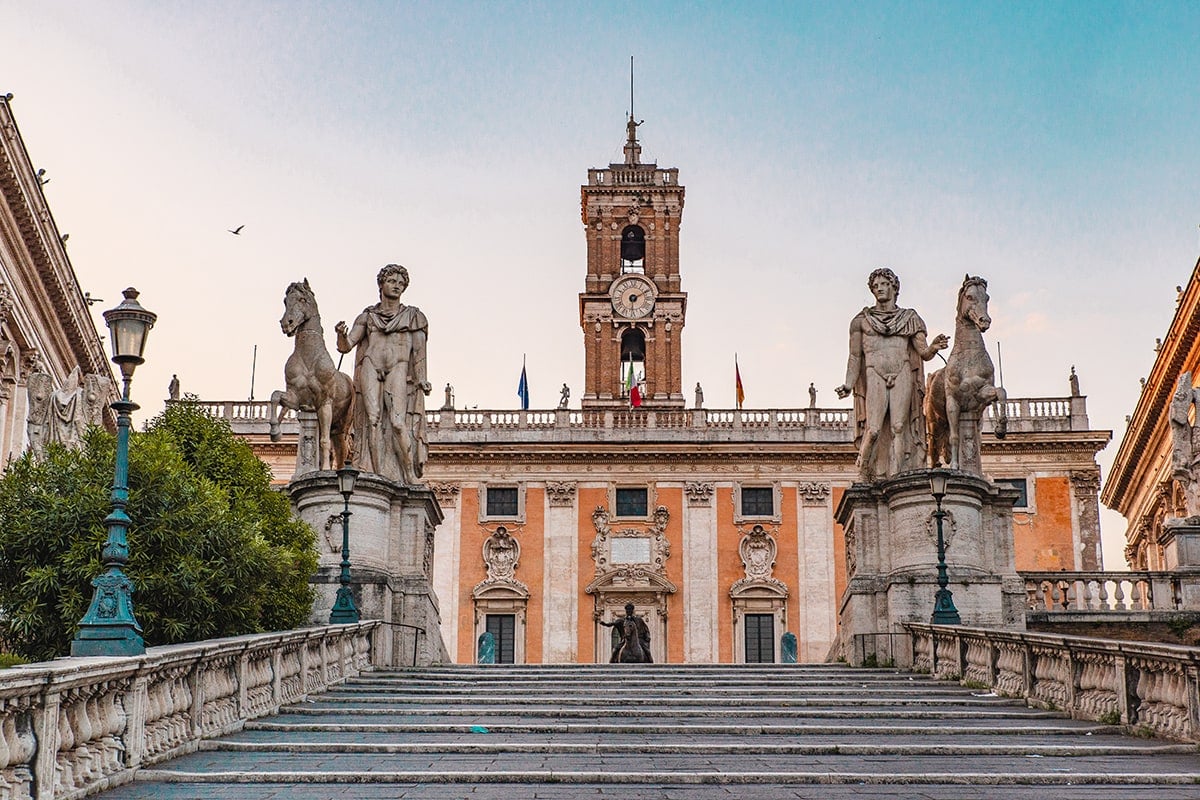
With only two days in Rome, you won’t have time to tour the Capitoline Museums. So while you’re here, just head to the back of the square for a splendid view of the Roman Forum and the Colosseum. It’s a postcard-worthy sight.
📸 Insider Tip: There are two viewpoints at the back of this square, and they’re reached by taking the paths on each side of the building with the tower. The path on the right side is Via del Campidoglio, and the one on the left is Via di S. Pietro in Carcere.
Be sure to check out both paths, as the viewpoints they lead to have different angles of the Roman Forum and ancient Rome. The viewpoint on Via del Campidoglio also features a cameo from the Colosseum!
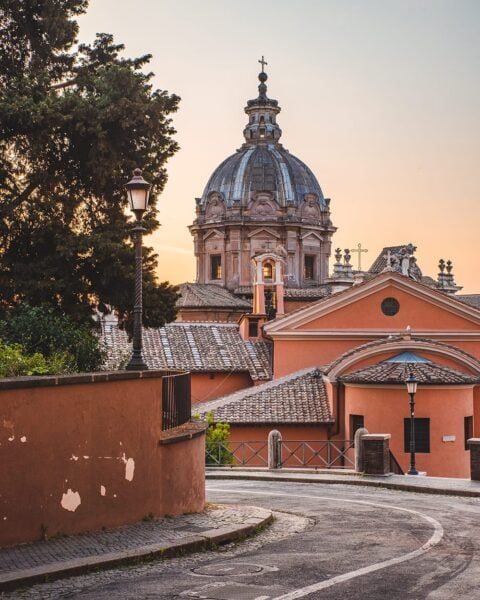

5. Vittoriano (Piazza Venezia)
4 min walk from Piazza del Campidoglio
Suggested visit time: 1:15 pm / Visit duration: 1.5 hours
Next to Piazza del Campidoglio, you’ll find one of the most eye-catching and majestic monuments in Rome: the Vittoriano (AKA Altar of the Fatherland) in Piazza Venezia.
Inaugurated in 1911, this monument was built as a tribute to Vittorio Emanuele II, the first king of Italy. Its splendid architecture will leave you speechless; you’ll see rows of Corinthian columns and endless stairs made of stunning white marble.


Take a walk around Piazza Venezia to see and capture this grand monument from different angles. Then, be sure to climb up its panoramic terrace. You’ll be doing some of it by foot via stairs, and the last bit via a glass elevator. Up top, enjoy a spectacular close-up view of Rome’s historic center.
🔥 Insider Tip: A regular ticket to the panoramic terrace costs €17, and you can book it in advance here. However, I recommend booking a ticket with an audio guide so that you can learn more about the history of this monument.

⏰ Opening hours: 9:30 am – 7:30 pm daily (last admission at 6:45 pm)
🎫 Panoramic terrace entrance fees: Adults - €17 | Under 18 years old - free
🌐 Best online ticket: Altar of the Fatherland Elevator Ticket
6. Galleria Sciarra
13 min walk from Vittoriano
Suggested visit time: 3 pm / Visit duration: 2-5 mins
Your next stop is a very quick one and might only take you 2-5 mins. But it’s well worth it. Tucked away from the tourist crowds, Galleria Sciarra is an impressive showcase of Art Nouveau architecture — a display of modern rather than ancient Roman history.
This small courtyard dates back to the 16th century, but in 1890, the affluent Sciarra family remodeled and adorned it with liberty-style frescoes and a glass roof. Today, it’s a wonderful way to see beautiful art without the crowds.
Due to its size, it only takes a few minutes to explore Galleria Sciarra. You’ll see that most people who “visit” are locals passing by, using its covered walkway as a shortcut. Admire the art and architecture here and snap a few photos before moving on.


⏰ Opening hours: Monday - Friday: 9 am - 6:30 pm 🎫 Entrance fees: Free
7. Fontana di Trevi (Trevi Fountain)
2 min walk from Galleria Sciarra
Suggested visit time: 3:15 pm / Visit duration: 20-30 mins
No two day Rome itinerary can be complete without the famous Trevi Fountain. Completed in 1762, it is the largest Baroque fountain in the Eternal City, and undoubtedly, one of the most impressive sights in all of Italy.
A famous tradition is to throw a coin into the water with your right hand over your left shoulder. Legend has it that tossing one coin means you’ll return to Rome, two coins: you’ll return and fall for an Italian, and three coins: you’ll end up marrying them in Rome.


Whether or not you believe in this myth, the coins go towards a great cause. Roughly one million euros get collected from the fountain every year to be donated to local charities.
🌅 Top Tip: The Trevi Fountain is always swarming with tourists during the day. Come back early in the morning, at sunrise, for a completely different atmosphere. You’ll be able to truly enjoy this place and take photos with barely anyone else around.

8. Piazza di Spagna (Spanish Steps)
10 min walk from Trevi Fountain
Suggested visit time: 4 pm / Visit duration: 30 mins
From the Trevi Fountain, make your way to the iconic Spanish Steps in Piazza di Spagna. As soon as you reach, you’ll see the Baroque-style Fontana della Barcaccia at the foot of the square.
This fountain commemorates a particularly bad flood of the River Tiber in 1598, which left a boat behind in Piazza di Spagna.
Be sure to climb up the 174 steps to the top of the Spanish Steps. Up there, you’ll be greeted by the beautiful Trinità dei Monti Church as well as artists displaying their paintings of Rome.

While the view from the top is fantastic, don’t forget to stop at the first terrace, too — you’ll get an amazing view of Via dei Condotti, the main luxury fashion shopping street of Rome. Then, walk back down the steps to reach your next destination.
💸 Please note: As of 2019, it is no longer allowed to sit on the Spanish Steps (in order to preserve this UNESCO Heritage Site). You can also get fined up to €400 if you’ve dirtied or damaged the steps in any way.

Related: 36 Most Famous Landmarks in Italy
9. Terrazza del Pincio
12 min walk from Spanish Steps
Suggested visit time: 4:45 pm / Visit duration: 20 mins
From the Spanish Steps, make your way to Piazza del Popolo, and then climb up the stairs on the right-hand side up to Terrazza del Pincio. This magnificent terrace offers an incredible view of the historic center. It’s also one of the best places to catch the sunset in Rome.
In fact, if you’re in Rome in the winter, it’s likely you’ll be here during sunset time (around 5 pm) if you follow this itinerary.
Watch the sky turn pink and orange above the historic monuments of Rome while live musicians provide the perfect background music to the view. (Yes, they’re always there!) Be sure to leave a tip 🙂 Even if you’re here before sunset, it’s still a view worth seeing.

Check the sunset time in Rome so that you don’t miss this experience!
🍝 Food Tip: If you want to end your day early, Antica Osteria Brunetti is just a 6-minute walk from Terrazza del Pincio and unlike the many tourist traps in the area, they serve authentic local dishes. Be sure to try their tonnarelli alla gricia!
10. Villa Borghese
Connected to Terrazza del Pincio
Suggested visit time: 5:05 pm / Visit duration: 30 mins
Terrazza del Pincio is situated inside a gigantic park named Villa Borghese. This charming green space is definitely worth taking a stroll in, and to get to your next stop (Galleria Borghese), you’ll need to walk through it anyway.
Stroll past cute dogs running on the grass, teenage lovers smooching under the trees, skaters showing off their latest tricks, people rowing boats in a lake (Laghetto Di Villa Borghese), and of course — Roman sculptures and fountains scattered everywhere.
If you want to visit Galleria Borghese next, it takes roughly 20 minutes to walk there from Terrazza del Pincio, through this park.
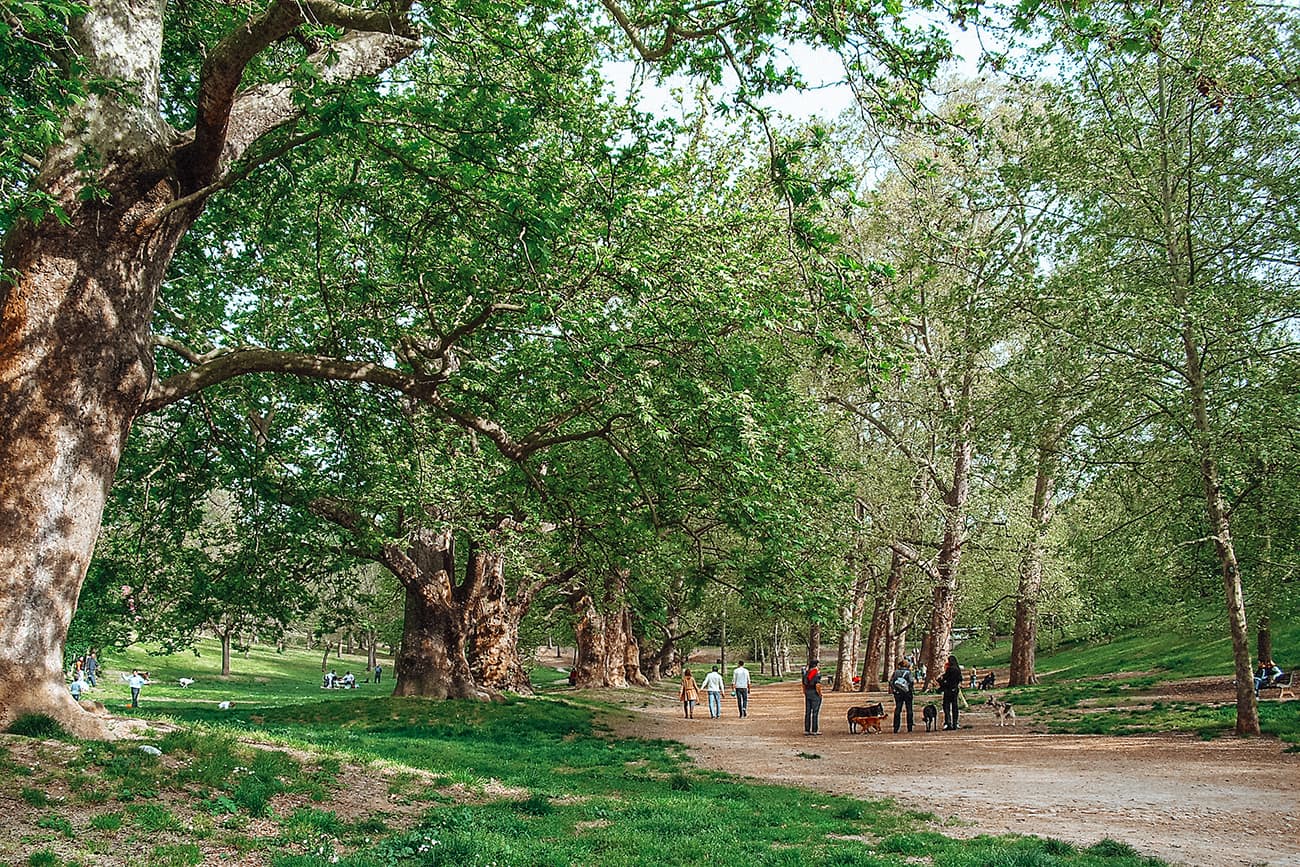
🚴 Insider Tip: If you want to skip the next stop and simply relax, you can rent a bike and ride around this lush park. There are rental shops on Viale Goethe and Viale dell’Uccelliera — both are inside the park. You can choose between regular bikes, 2-people tandem bikes, and even 4-people quadricycles (perfect for families with kids).
11. Galleria Borghese
Located inside Villa Borghese
Suggested visit time: 5:45 pm / Visit duration: 1-2 hours
The last stop of this Rome 2 day itinerary is Galleria Borghese (Borghese Gallery), one of the most impressive museums in Rome. It is situated at the eastern end of the park, and you can easily make your way there on foot or by bike from Terrazza del Pincio.
Galleria Borghese showcases an impressive collection of art, including masterpieces by Raphael, Botticelli, Caravaggio, and Tiziano. You’ll see breathtaking mosaics, stunning frescoes on the walls and ceilings, and impressive sculptures in every hall.

Galleria Borghese is open from Tuesday to Sunday from 9 am to 7 pm, with the last entrance allowed at 5.45 pm. Note that except for the 5.45 pm slot, you can only enter at the whole hour (e.g., at 11 am or 5 pm, but not at 11:30 am or 5:15 pm).
🔥 Top Tip: Don’t enjoy waiting in line? Book a Borghese Gallery guided tour (⭐️ 4.9/5) to get right in! This will also allow you to get the colorful backstory behind each piece of art. If you don’t want a tour, you can still save lots of time with a skip-the-line ticket.

⏰ Opening hours: Tuesday - Sunday: 9 am - 7 pm (last entry at 5.45 pm) | Closed on Mondays 🎫 Entrance fees: Regular - €15 | Age 18-25 - €4 | Free with the Roma Pass (but you still need to book in advance; more info here) 🧔🏻 Recommended guided tour: Borghese Gallery guided tour (⭐️ 4.9/5)
12. Aperitivo + Dinner Near Piazza del Popolo
After visiting the Galleria Borghese, it’s time to have dinner. I recommend making your way back to the Terrazza del Pincio and Piazza del Popolo, which is surrounded by restaurants. It should take you around 20 minutes to walk there from Galleria Borghese.
They say when in Rome, do as the Romans do. And in this case, it means going for an aperitivo — a pre-meal drink meant to “open the stomach” before dining. This is a big Italian cultural tradition that’s very worth experiencing.
🍹 Note: Aperitivo usually takes place between 6 pm and 8 pm in Italy. Then, we usually go for dinner between 8 pm and 10 pm. While this may seem late to some of you, don’t worry — you’ll find tons of snacks paired with your aperitivo, so you won’t starve 🙂

🍹 For aperitivo: Acquaroof Terrazza Molinari — This restaurant/terrace bar is just a few steps from Piazza del Popolo. Enjoy some Aperol Spritz or Negroni on their terrace, and nibble on olives, cheese, and bread. Bonus: you also get a beautiful view of Ancient Rome from there!
🍝 For dinner: Il Gabriello — While you can stay in Acquaroof Terrazza Molinari for dinner, too, you can also walk 7 minutes to this restaurant for some of the best cacio e pepe of your life. They also serve tons of delicious seafood and dessert.
Wherever you choose, just be sure to make your reservation weeks in advance!

13. Evening Walk in the Historic Center
If you still feel like exploring after dinner, it’s a great idea to revisit some of the attractions you saw during the day at nighttime, when they’re lit up in all their glory.
Another advantage of sightseeing at night is that there are fewer people around, so it’s a lot more peaceful, too.
Some of the key places to see at night include the Colosseum, Trevi Fountain, Piazza Navona, Pantheon, Spanish Steps, and Vittoriano. If you have extra time, head over to Piazza della Repubblica to see more gorgeously lit-up buildings and fountains.

🛵 Insider Tip: If you enjoy getting local knowledge from a tour guide, join the popular Rome 3-Hour Evening Walking Tour (⭐️ 4.7/5) to see the sun setting over the stunning churches, romantic squares, and fountains of Rome.
Read more: Top 12 Rome By Night Tours
🗓 2.5 Days in Rome: Additional Things to Do
If you have an extra half-day in Rome, here are some interesting ways to spend your time. You’ll see different options depending on what your interests may be.
Option 1: Baths of Caracalla (Terme di Caracalla)
Visit time: 1-2 hours
If you’re curious to see ancient Roman public baths, head over to Baths of Caracalla, which is about a 10-minute walk from the Colosseo Metro station on Line B. Built between AD 212 and 216, these baths were some of the biggest thermal complexes of Ancient Rome.
The Romans loved going to public baths; it was their favorite way to socialize. Baths of Caracalla housed more than just baths, though. For over 300 years, people exercised there, strolled the gardens, visited libraries, and worshipped the gods at the temples.
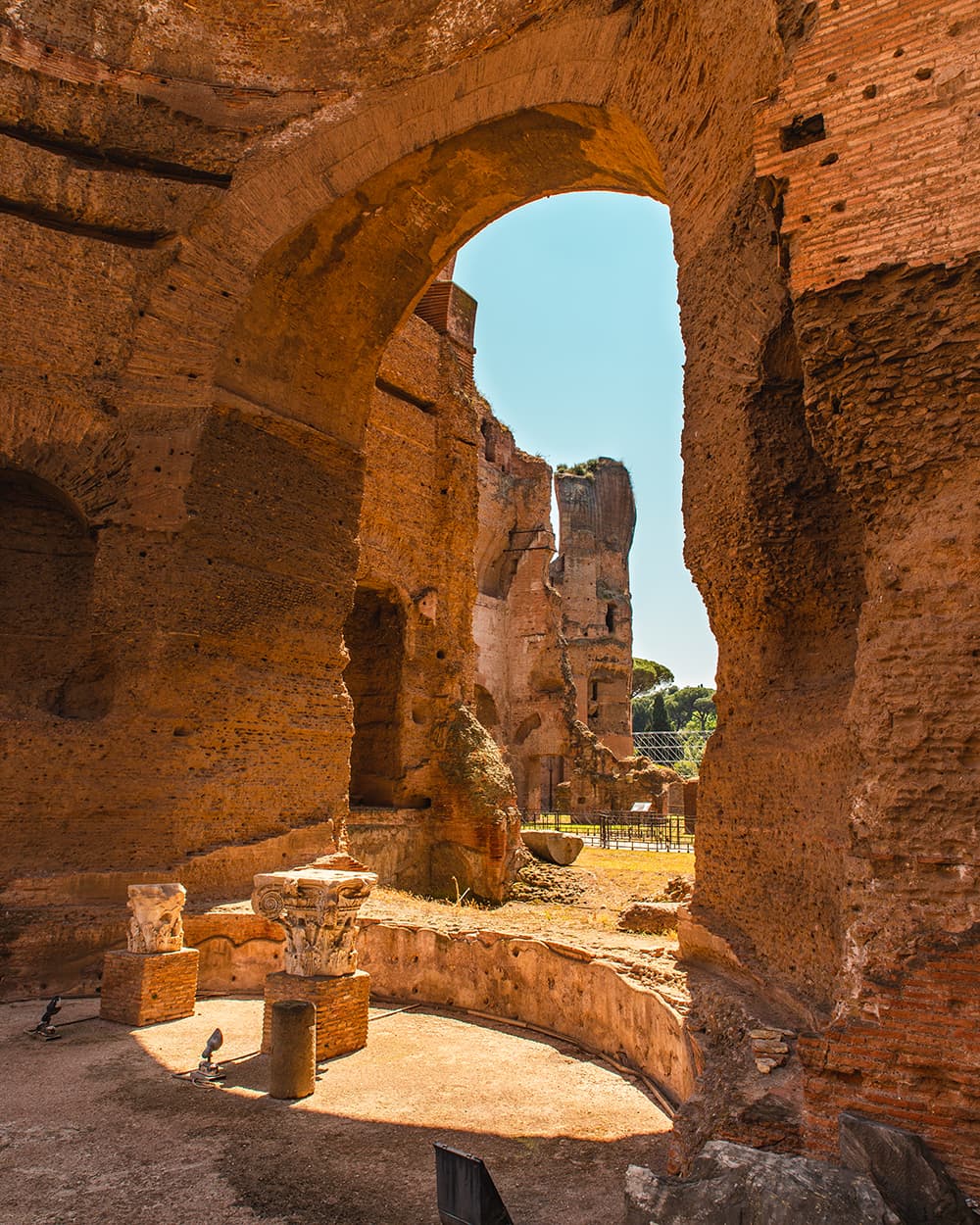
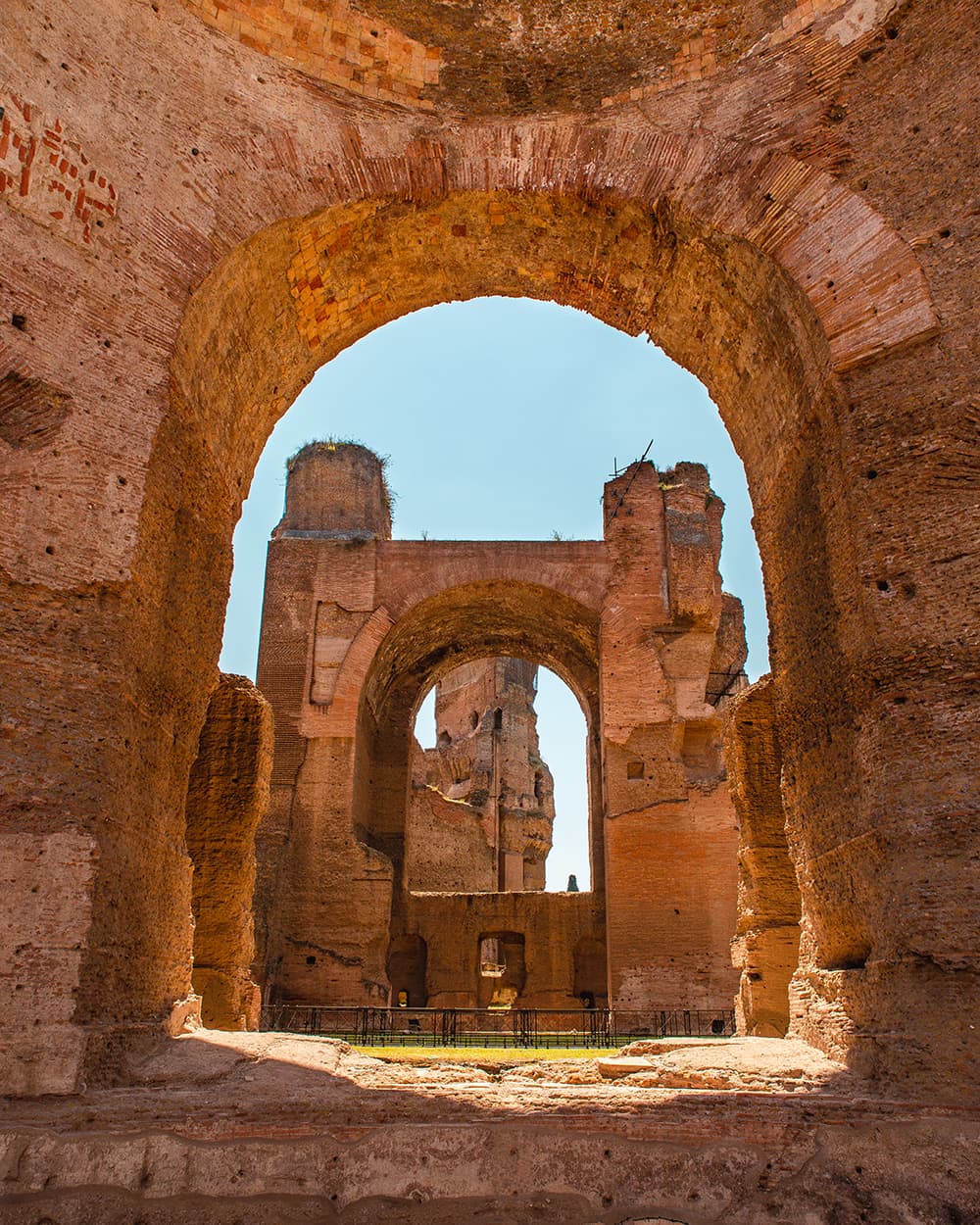
🎧 Top Tip: To fully immerse yourself in Baths of Caracalla, grab a set of virtual reality goggles at the entrance for an extra €7. With it, you’ll see the digital reconstruction of how each site here looked back in the days, and won’t have to only imagine it.
⏰ Opening hours: 9 am - 7:15 pm daily 🎫 Entrance fees: Regular - €8 | EU citizens aged 18-25 - €2 🧔🏻 Recommended guided tour: Caracalla Baths & Circus Maximus Tour (⭐️ 4.8/5)
Option 2: Pizza/Pasta/Tiramisù Cooking Classes
Duration: 2.5-4 hours
If you’ve had enough of ancient ruins and sightseeing, then taking a culinary class with expert local chefs is a great alternative thing to do. There’s nothing better than devouring some delicious Italian food that you’ve prepared with your own hands!
Best Morning Cooking Classes
- 4-Hour Pizza + Pasta Cooking Class (⭐️ 4.8/5) — Learn how to make 10+ pasta shapes and Neapolitan pizza in a real pizza oven. Enjoy an all-you-can-eat feast at the end.
- Pasta Cooking Class in the Kitchen of Mamma (⭐️ 4.8/5) — Learn how to make homemade pasta like an Italian and enjoy the fruits of your labor with a glass of wine.
Best Afternoon Cooking Classes
- Pasta & Tiramisu Workshop with Dinner (⭐️ 4.8/5) — The best cooking class in Rome, where you make pasta and tiramisù from scratch before devouring it all.
- Pasta-Making Class with a Local Chef (⭐️ 4.9/5) — Enjoy a glass of Prosecco with snacks before learning how to make fresh pasta with a professional Italian chef.

🏡 Where to Stay in Rome for 2 Days
The best area to stay in Rome for the weekend / 2 days is centro storico, the historic center of the city. This way, you’ll be within walking distance of almost all the main attractions in Rome, which could save you a lot of time. Here are my top picks.

OVERALL TOP PICK: Otivm Hotel (⭐ 9.0)
This top-value hotel features a dreamy roof terrace that offers breathtaking views of the historic center. Guests can enjoy breakfast there with an epic view. Most attractions are within close walking distance, and the rooms are luxurious — yet priced very generously.

TOP ROMANTIC HOTEL: Singer Palace (⭐ 9.5) This magnificent boutique hotel is only a 5-min walk to the iconic Trevi Fountain and is perfect for couples looking for a romantic getaway. Their rooftop restaurant is a magical place to enjoy a dreamy breakfast or dinner, and all the rooms feature gorgeous décor.

TOP LUXURY HOTEL: Martis Palace (⭐ 9.4)
This stunning hotel next to Piazza Navona features an incredible roof terrace with a view. There is also an on-site bar, free WiFi throughout the property, and soundproofed rooms each with a flat-screen TV. In addition, guests can enjoy a discount at a nearby spa!

TOP BUDGET HOTEL: Hotel Amalfi (⭐ 8.6)
This hotel is very close to the Termini train station and is a 15-min walk to the Colosseum. Each room features an AC, free WiFi, a flat-screen TV, and beautiful frescoed ceilings. There’s also an extensive breakfast with eggs, bacon, and fresh pastries.
Read more: Where to Stay in Rome: The Best Areas + Hotels
🎟️ Rome in 2 Days: Save Money & Skip the Lines
There’s an easy way to save time and money on a 2 day trip to Rome: tourist passes that give you discounts and fast track entry into the most crowded attractions in the city.
There are many kinds of Rome tourist passes, but the one most suited for a 2-day or weekend trip to Rome is the 48-hour Roma Pass.
💳 Roma Pass: 48-Hour City Card
- Free skip-the-line admission to 1 museum or archaeological site (like the Colosseum) ✅
- Discounted tickets for all other museums and archaeological sites visited afterward ✅
- Free unlimited use of Rome’s public transportation (metro, buses, trams, etc.) ✅
- Free guidebook + map of Rome ✅
Spending a long weekend in Rome? Check out the 72-hour Roma Pass, the Best of Rome All Access Pass, and the OMNIA Vatican & Rome Card (our top pick) to save more money!


🗺 Map of Your 2 Days Rome Itinerary
Here’s a map of what to see in Rome in two days, including all the places and activities mentioned in this itinerary. You can click here to see it in full on Google Maps.
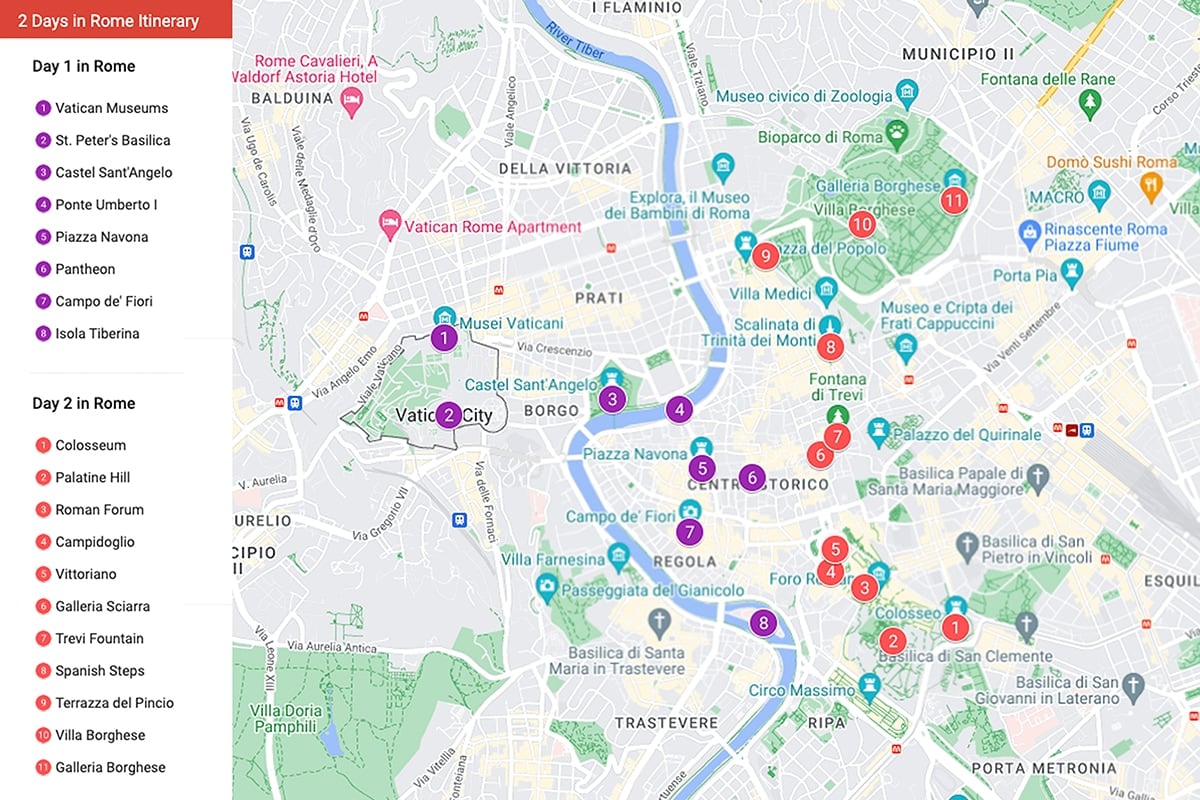
🎉 Essential Tips for Spending a Weekend in Rome
If you’re planning on going away for a weekend to Rome, here are some important things to keep in mind as you plan your itinerary. First things first…
🎨 Visit the Vatican on a Saturday! This is the most important tip for spending weekend breaks in Rome. The Vatican Museums are closed on Sundays. The exception is if you’re visiting on the last Sunday of any month, when they’re not only open but also free to visit! (Check official real-time updates as this offering is sometimes suspended.)
🗓 Book everything in advance: Weekends are especially busy in Rome. Book tickets to attractions well in advance to avoid long lines, and make restaurant reservations in advance, too. Pretty much all the restaurants in the historic center have English-speaking staff.
🏡 Stay in the historic center: Anyone spending just 2 days in Rome, Italy should consider staying very close to the main attractions, which all lay in the historic center (centro storico). This would help maximize your sightseeing time and minimize transportation time.
🧳 Leaving in the evening? Consider storing your luggage at the historic center if you don’t want to go back to your hotel to retrieve it. You can use the City Center Luggage Storage or the Termini Station Luggage Storage.


🎒 Safety Tips for 2 Days in Rome
There’s one important thing to keep in mind when visiting Rome: it is the second most pickpocketed city in Europe (the first being Barcelona). Pickpockets thrive in the city center, especially at the main tourist attractions, on buses, and on the Metro.
The pickpockets in Rome are super fast and extremely skilled at what they do, so always keep an eye on your belongings. Never leave your backpack hanging off the back of a chair at a restaurant, and never let a cross-body bag hang behind you — always keep it in sight.
🚌 Insider Tip: The risk of theft is especially high at the Termini train station and on the popular Bus No. 64, which goes from Termini to the Vatican. Be extra careful at the crowded Metro stations of Spagna, Barberini, Cipro, and Colosseo as well.
Here are a few items you can pack to make your weekend away to Rome safer:
This Slash-Proof Purse has slash-resistant body panels and shoulder straps, which can be secured to a stationary object. It comes with RFID blocking too to protect your cards & IDs, so you can travel with peace of mind.
This Anti-Theft Travel Backpack comes with a fixed anti-theft password lock, RFID blocking which protects your cards and IDs, and a USB charging port. It also works great as a laptop bag or a hiking daypack.
✈️ How to Get to Rome – By Air & Train
If you’re arriving from another city in Italy, consider taking a domestic train to Roma Termini, the most central train station in town. You can find train timetables on Trenitalia or Omio.
Oftentimes, flying is the faster way to get to Rome, even if you’re coming from within Italy. There are two airports in Rome: Fiumicino (FCO) and Ciampino (CIA).
Fiumicino (AKA Leonardo da Vinci International Airport) is the main international airport and is connected by direct flights to countless cities around the world, including Rio de Janeiro, Beijing, and New York City.
Ciampino is a much smaller airport that serves mostly domestic and European flights. Both of these airports are well connected to the city center via trains and buses, so simply choose according to flight prices.

🚗 Getting From Fiumicino Airport to Rome by Car / Taxi
The most convenient way to get from Fiumicino Airport to Rome is to book a private transfer directly to your hotel. The price is the same as taking a taxi, but you won’t need to wait in lines for a taxi at the airport. The journey should take 40-50 mins depending on traffic.
🚕 Insider Tip: If you do prefer taking a taxi, always take an official white taxi from the taxi stand outside the terminal. Do not go with the drivers waiting inside the terminal. A taxi ride from Fiumicino to the center of Rome should cost you a fixed rate of €50.
🚊 Getting From Fiumicino Airport to Rome by Bus/Train
If you’re looking for a more affordable way of getting to Rome, book a direct bus transfer from Fiumicino Airport to Roma Termini. The bus ticket costs around €6 and the journey takes 1 hour. You can then take the metro to your hotel from Roma Termini.
There’s also a bus that takes you from Fiumicino to Vatican City, if you’re staying in that area. This bus ticket costs around €7 and the journey takes around 50 minutes.
Trains will get you to Rome in around half the time the bus takes. In just 30 mins, the Leonardo Express train takes you directly from Fiumicino to Roma Termini, which is on both Metro lines A and B. A ticket costs €18.

🚌 Getting From Ciampino Airport to Rome
A taxi from Ciampino Airport to the city center should cost €31 and would take around 40-50 mins depending on traffic. For more convenience, you can also book a private transfer directly to your hotel.
🌟 Top Tip: The best balance between price and convenience is to book a shuttle bus transfer. It’ll take you directly to Roma Termini (which is on both Metro lines A and B) in 45 mins and the ticket costs €6.
With that said, the cheapest option is to take the regional train. It’d get you to Roma Termini in 30-40 mins and only costs €2.70. However, you’d have to take a bus from the ‘Ciampino Airport’ stop to the ‘Ciampino’ stop first, and switch to another train from there.

🛵 Getting Around Rome for 2 Days
🚇 By Foot & By Metro
Almost all the tourist attractions in Rome are within walking distance of each other, so the best way to explore the city is by walking. The city center is incredibly pleasant to stroll. Not to mention, you’ll discover the best hidden gems by getting lost in its cobblestone alleys.
Alternatively, you can take the Metro if your feet get sore (a likely scenario when visiting Rome). There are 3 Metro lines in Rome: Line A (red), Line B (blue), and Line C (green).
Most tourist attractions in Rome are connected by the Metro, and it’s likely you’ll have to take it when visiting the Vatican, which is a bit of a walk from the historic center.


🚌 By Public Bus
You can also take public buses to get around Rome, although I don’t recommend it. Traffic in Rome is really bad, so getting around by bus or car can be very time-consuming.
The buses in the city center are also usually incredibly crowded, and as a result, a breeding ground for pickpockets. I suggest taking the Metro instead for efficiency, but watch out for your belongings there as well.
🎫 Tickets for Public Transportation
On buses, trams, and before entering the Metro platforms, you’ll find machines where you can tap your contactless credit, debit, or prepaid card to pay. Each ride costs €1.50, and once you tap your card, your payment lasts 100 minutes.
To avoid potential penalty fees, remember to tap your card each time you change means of transport. Taps made within the validity period of the ticket (100 mins) do not correspond to a new payment.
If you don’t have a contactless card, you will need a paper BIT ticket (biglietto semplice) to ride public transport in Rome. A one-way ticket costs €1.50 and is valid for 100 mins. It can be used for the Metro, buses, trams, and urban trains inside Rome.
You can buy BIT tickets inside any Metro station and at any tabaccheria (tobacco shop) or edicola (newsstand) around town. You will not be able to buy BIT tickets inside buses, so make sure to have one with you before boarding!
Alternatively, you can get free bus & metro rides with the Roma Pass.
🎫 Top Tip: If you’re using a BIT ticket, be sure to validate your ticket once you get on the bus, at one of the ticket machines onboard. Otherwise, you can get fined when the police do their checks.

🧳 Luggage Storage in Rome
⛲️ At the Centro Storico (Historic Center)
While most hotels in Rome will let you store your luggage with them before check-in/after check-out, there’s an easy way to store your luggage in the historic center.
Head to City Center Luggage Storage – they have locations in Piazza Navona, the Colosseum, and the Vatican.
🚉 At the Roma Termini Station
Alternatively, you can store your luggage at the Roma Termini station as well.
Head over to Via Giovanni Giolitti 127 and you’ll see the luggage storage store on the sidewalk across from the station. You can also book this service online here.
Roma Termini is the most well-connected station in the entire city. It’s on Metro lines A and B and is the final destination for a lot of airport trains and shuttles. If you’re traveling to Rome by train from other cities in Italy, Termini is where you’ll arrive.

💰 Rome 2 Days Itinerary Budget
For budget travelers, the daily cost of traveling in Rome should be around €50 in total. This means staying in cheap hostels and getting pizza/panini on the go rather than sitting down in restaurants.
Comfort travelers are likely to spend around €100 per day, staying in boutique hotels and spending moderately at restaurants. Luxury travelers are likely to spend over €175 a day. Here’s a quick breakdown of the budget:
🏨 Accommodation (per night): €7-25 budget / €40-85 comfort / €85-450 luxury
🍝 Food: Around €15 at restaurants (for a main dish + non-alcoholic drink) / €3-7 for pizza/panini to-go
🚇 Transportation: €1.50 per every Metro, bus, tram, or urban train ticket (valid for 100 mins) | Free with the Roma Pass
🎫 Admission to museums & attractions: €8-25 | Some are free or discounted with the Roma Pass

🍕 Where to Eat on a Rome 2 Days Tour
No Rome weekend itinerary would be complete without some epic foodie adventures. While this guide already has tons of food tips, here are some more top-notch eateries, including the best places in Rome to enjoy authentic gelato and tiramisù.
- Roscioli — This Michelin restaurant has some of the best carbonara in Rome.
- Felice a Testaccio — One of the best places to have cacio e pepe in Rome.
- Forno Campo de’ Fiori — Try some of the best pizza in town here; don’t miss the pizza bianca with mortazza, a local specialty.
- Cantina & Cucina — A cozy place with all-around incredible pizza and pasta.
- Gelateria Come il Latte — An absolute must-visit if you want the most heavenly gelato.
- Two Sizes Tiramisù — The best tiramisù in Rome is here; try their pistacchio tiramisù!

☀️ The Best Time to Visit Rome
The best time to take 2-day or weekend trips to Rome really depends on your priorities. Weekdays will always be less crowded than weekends, although Rome will never be fully void of crowds. Here’s a quick rundown of the different seasons in Rome.
❄️ Low season: Mid-November to mid-December and mid-January to early March are the best months to visit Rome for the least amount of crowds. Temperatures are around 3°-13°C / 37°-55°F. Note that Christmas and New Year’s are exceptions and see a big increase in tourists.
🍁 Shoulder season: Mid-March to early May and mid-September to early November will see a moderate amount of crowds and mild temperatures (9°-22°C / 48°-71°F). The shoulder season is liked by many, so definitely book tickets for attractions in advance!
🌸 High season: Mid-May to early September is when Rome is at its busiest. Expect very long lines at attractions and high hotel prices. Avoid this season if you can’t stand crowds. The weather is at its hottest during this time of year (17°-32°C / 62°-90°F).
I personally recommend the shoulder season for mild temperatures and a more manageable level of crowds compared to the peak season.

🔮 Travel Insurance for Italy
I never thought I needed travel insurance… until I did. And I’m a careful traveler. Sometimes, things are simply out of your control.
During my many years of traveling, I’ve gotten into a really scary car accident while riding in the back of a taxi, have needed emergency dental services, and have almost had all my valuables stolen. (These were all from separate trips, thankfully).
I use Heymondo and can highly recommend them — they provide 24/7 worldwide assistance (with Covid-19 coverage included), and no hidden out-of-pocket fees.

🏟 2 Day Itinerary Rome: Final Thoughts
So, can you do Rome in 2 days? The answer is yes, but you really need to plan ahead and keep in mind that you won’t be able to see everything that the city has to offer. If you have more time or are planning a long weekend to Rome, you might like my 3-day Rome itinerary.
I hope you’ve learned a lot from this guide, and that you now have a good idea of what to see in Rome in 2 days. From ancient fortresses to exquisite food tours, your trip will be packed with exciting adventures. If you have any questions at all, feel free to drop a comment below.

Read more: The Best 3-Day Rome Itinerary + Tips From a Local
📸 My Rome Photography Gear
This is the photography gear I used to capture many of the photos in this guide. You can also see my recommendations for the best cameras for bloggers for more options other than the ones listed below.
- Cameras: Nikon D610 + Sony a7III (check out the best Sony lenses)
- Main lens: Tamron SP 24-70mm f/2.8
- Wide-angle lens: Tokina AF 16-28mm f/2.8
- Prime lens: Nikon 50mm f/1.4 G
- Tripod: Manfrotto Element Traveller Tripod (Ball Head)

I hope this Rome in a weekend itinerary has been helpful and informative!
For further reading on Rome, discover:
🏡 Where to Stay in Rome: Best Areas + Hotels
🏟 12 Best Rome Hotels with Colosseum Views
🍝 1 Day in Rome: 4 Amazing Itinerary Ideas
🛵 3 Days in Rome: The Ultimate Itinerary
⛲️ 4 Days in Rome: The Perfect Itinerary
🌃 Top 12 Rome By Night Tours to Take
🌿 27 Fantastic Day Trips From Rome, Italy
🏖 14 Best Beaches Near Rome, Italy
For further reading on Italy, discover:
🇮🇹 22 Most Beautiful Places to Visit in Italy
🏙 24 Most Beautiful Cities to Visit in Italy
🏞 16 Most Beautiful Lakes to Visit in Italy
Pin for Later




